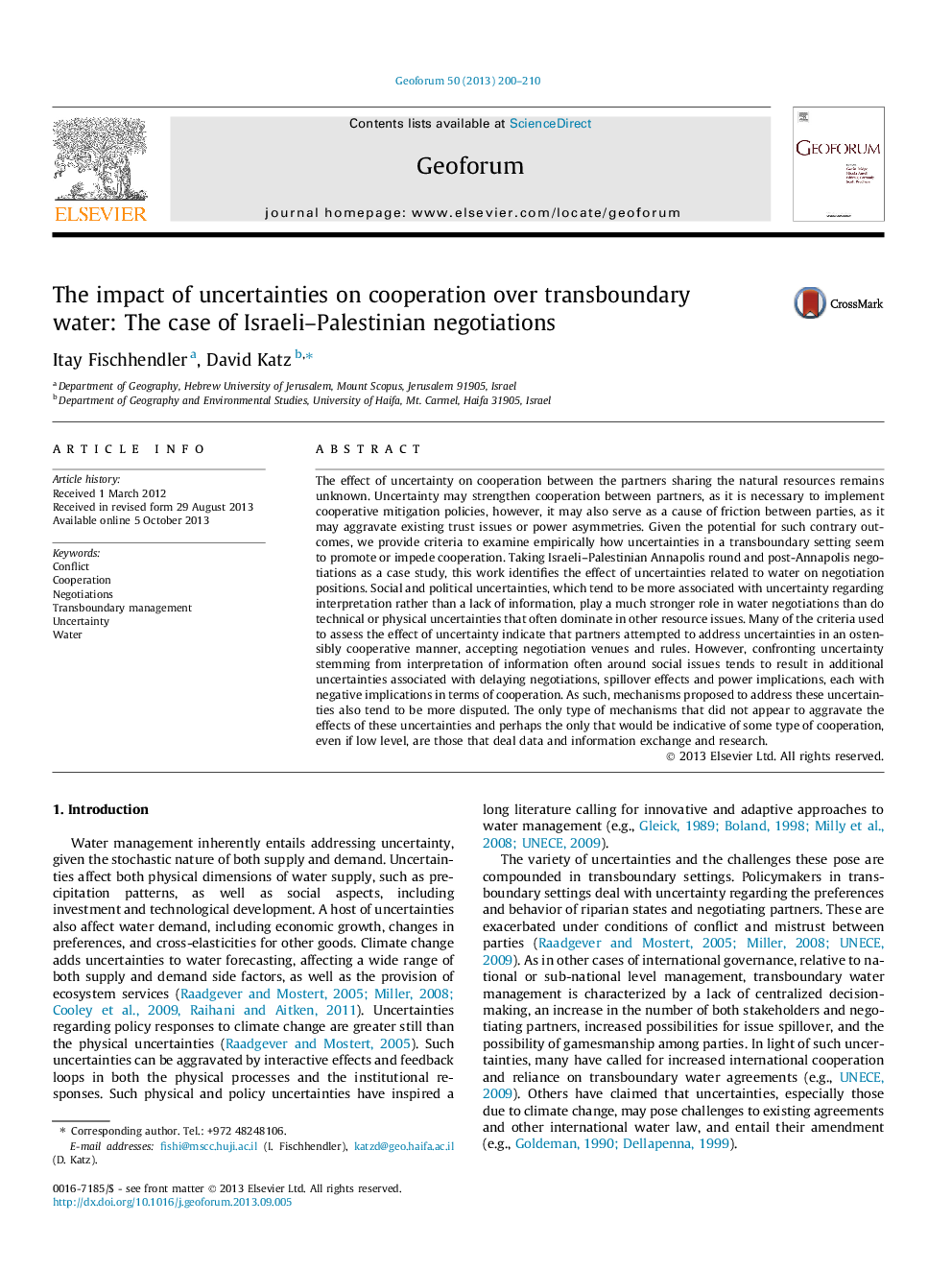| کد مقاله | کد نشریه | سال انتشار | مقاله انگلیسی | نسخه تمام متن |
|---|---|---|---|---|
| 5074133 | 1477139 | 2013 | 11 صفحه PDF | دانلود رایگان |
عنوان انگلیسی مقاله ISI
The impact of uncertainties on cooperation over transboundary water: The case of Israeli-Palestinian negotiations
ترجمه فارسی عنوان
تاثیر عدم قطعیت در همکاری در مورد آب های مرزی بین المللی: مورد مذاکرات اسرائیل و فلسطین
دانلود مقاله + سفارش ترجمه
دانلود مقاله ISI انگلیسی
رایگان برای ایرانیان
کلمات کلیدی
تعارض، همکاری، مذاکرات، مدیریت فرامرزی، عدم قطعیت، اب،
ترجمه چکیده
تأثیر عدم قطعیت در همکاری میان شرکای مشترک منابع طبیعی هنوز معلوم نیست. عدم اطمینان می تواند همکاری بین شرکا را تقویت کند، زیرا لازم است سیاست های کاهش همکاری را اجرا کند، اما ممکن است به عنوان یک عامل اصطکاک بین طرفین نیز باشد، زیرا ممکن است مشکلات اعتماد موجود یا عدم تقارن قدرت را تشدید کند. با توجه به پتانسیل چنین نتایجی متضاد، ما معیارهایی را برای بررسی تجربی درمورد اینکه چگونه عدم اطمینان در یک محیط ترابری، به ترویج و یا مانع همکاری می پردازند، ارائه می دهیم. با توجه به مذاکرات دورۀ مذاکرات اسرائیل و فلسطین در آناپولیس و مذاکرات بعد از آناپولیس به عنوان یک مطالعه موردی، این اثر تأثیر نامطمئن بودن مربوط به آب در موقعیت مذاکرات را مشخص می کند. عدم قطعیت اجتماعی و سیاسی که بیشتر با عدم اطمینان در مورد تفسیر همراه با فقدان اطلاعات بیشتر مرتبط است، نقش مهمی در مذاکرات آب ایفا می کند، از جمله عدم اطمینان فنی یا فیزیکی که اغلب در مسائل مربوط به منابع دیگر تسلط دارد. بسیاری از معیارهای مورد استفاده برای ارزیابی تأثیر عدم قطعیت نشان می دهد که شرکا تلاش می کنند تا با عدم هماهنگی به شیوه ای به ظاهر تعاونی، با پذیرش مکان های مذاکره و قوانین، اقدام به حل و فصل اختلاف نظر کنند. با این حال، مقابله با عدم اطمینان ناشی از تفسیر اطلاعات اغلب درمورد مسائل اجتماعی منجر به عدم اطمینان اضافی در ارتباط با تاخیر در مذاکرات، تأثیرات اضافی و پیامدهای قدرت می شود، هر کدام با تأثیرات منفی از نظر همکاری. به همین ترتیب، مکانیزم هایی پیشنهاد شده برای رسیدگی به این عدم اطمینان نیز تمایلی به بحث بیشتر ندارند. تنها نوع مکانیسم هایی که به نظر نمی رسد اثرات این عدم قطعیت را تشدید می کند و شاید تنها نشان دهنده نوعی از همکاری، حتی اگر سطح پایین، کسانی هستند که داده ها و مبادله اطلاعات و پژوهش را مدیریت می کنند.
موضوعات مرتبط
علوم انسانی و اجتماعی
اقتصاد، اقتصادسنجی و امور مالی
اقتصاد و اقتصادسنجی
چکیده انگلیسی
The effect of uncertainty on cooperation between the partners sharing the natural resources remains unknown. Uncertainty may strengthen cooperation between partners, as it is necessary to implement cooperative mitigation policies, however, it may also serve as a cause of friction between parties, as it may aggravate existing trust issues or power asymmetries. Given the potential for such contrary outcomes, we provide criteria to examine empirically how uncertainties in a transboundary setting seem to promote or impede cooperation. Taking Israeli-Palestinian Annapolis round and post-Annapolis negotiations as a case study, this work identifies the effect of uncertainties related to water on negotiation positions. Social and political uncertainties, which tend to be more associated with uncertainty regarding interpretation rather than a lack of information, play a much stronger role in water negotiations than do technical or physical uncertainties that often dominate in other resource issues. Many of the criteria used to assess the effect of uncertainty indicate that partners attempted to address uncertainties in an ostensibly cooperative manner, accepting negotiation venues and rules. However, confronting uncertainty stemming from interpretation of information often around social issues tends to result in additional uncertainties associated with delaying negotiations, spillover effects and power implications, each with negative implications in terms of cooperation. As such, mechanisms proposed to address these uncertainties also tend to be more disputed. The only type of mechanisms that did not appear to aggravate the effects of these uncertainties and perhaps the only that would be indicative of some type of cooperation, even if low level, are those that deal data and information exchange and research.
ناشر
Database: Elsevier - ScienceDirect (ساینس دایرکت)
Journal: Geoforum - Volume 50, December 2013, Pages 200-210
Journal: Geoforum - Volume 50, December 2013, Pages 200-210
نویسندگان
Itay Fischhendler, David Katz,
